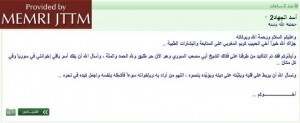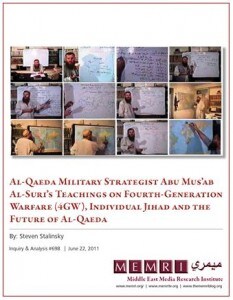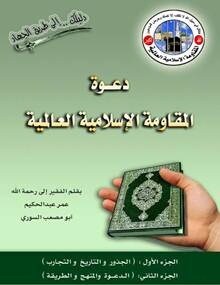On February 2, 2012, "Asad Al-Jihad2," a prominent member of the leading Shumoukh Al-Islam jihadi forum and a trusted source for jihadis, stated that Abu Mus'ab Al-Suri had been freed from a Syrian prison. His February 2, 2012 post on the forum said: "I bring you glad tidings. The release of Sheikh Abu Mus'ab Al-Suri has been confirmed on our end, and he is now free, thanks to Allah. I ask Allah to set free the rest of our brothers in Syria and everywhere else..."
Earlier, on January 13, the Middle East Transparent website had reported that Al-Suri had been released "recently" by Syrian authorities. It added that "the release could be a warning to signal Syria's willingness to put an end to all 'security cooperation' with the U.S.'"[1]
MEMRI Report on Al-Suri and His Importance in Al-Qaeda Published in June
On June 22, 2012, MEMRI released an extensive report on Al-Suri and his importance - even from his prison cell - to Al-Qaeda and its followers in the West, titled "Al-Qaeda Military Strategist Abu Mus'ab Al-Suri's Teachings on Fourth-Generation Warfare (4GW), Individual Jihad, and the Future of Al-Qaeda."
The report's concluding chapter, "The Impact of Al-Suri's Strategic Theory on Al-Qaeda's Future," discussed the possibility of Al-Suri's release from prison. It stated:
The assassination of Osama bin Laden on May 2, 2011 provided another opportunity for Al-Suri's philosophy to gain in stature within Al-Qaeda's ranks. As professor of defense analysis at the United States Naval Postgraduate School Dr. John Arquilla wrote in Foreign Policy magazine on May 10, 2011, "Al-Suri, who likely plotted the 2004 Madrid bombing that caused the fall of the Spanish government and the withdrawal of Spanish troops from Iraq, has been in custody for over five years. His name is scarcely known to the mass publics of the world, and to surprisingly few in the military. But his ideas, articulated at great length - clocking in at some 1,600 pages - in his e-book The Global Islamic Resistance Call, seem to have carried the day in setting Al-Qaeda's new course. He and bin Laden used to spar over this approach, in which links to the core were to be almost completely severed in favor of local cells' freedom to chart their own courses and plan their own violent campaigns."
The release of the June 3, 2011 official Al-Qaeda media wing Al-Sahab video titled "Do Not Rely on Others, Take [the Task] Upon Yourself" provides further evidence that Al-Suri's doctrine will be a part of Al-Qaeda's future plans. In the video, Al-Qaeda Central's leaders all focused on the topic of al-jihad al-fardi ("individual jihad"), namely, jihad operations performed by a single individual or by a small group, which was one of Al-Suri's main principles. Abu Yahya Al-Libi explained the concept of individual jihad, defining it as "a single person or small group of mujahideen carry out a military operation according to the laws of the shari'a...a one-man operation in the midst of the infidels' territory may be much more effective - in terms of precision and choice of target - than dozens of operations on the battlefield."
Attiyat Allah Al-Libi praised individual jihad as 'one way of penetrating the enemy's ranks; [such operations] constitute an attack by a single individual against a great and numerous enemy...this enemy has clear weak spots, and his interests are spread across our lands, his lands, and the whole world - and they are important targets that can be reached with relative ease..."
Anwar Al-Awlaki's statement focused on Major Nidal Hasan, the sole suspect in the 2009 Fort Hood shooting which killed 13 people and wounded 30 more. According to Al-Awlaki, Hasan serves as a model for followers of Al-Qaeda in the West dedicated to individual jihad explains, "What he [i.e. Nidal Hasan] did was a heroic act - a magnificent operation... I support what he [i.e. Nidal Hasan] did, and call upon anyone who belongs to Islam, [or] claims to belong to Islam, and [while] he serves in the U.S. Army, to follow the footsteps of Nidal Hasan. The example of Nidal Hasan is magnificent, we ask almighty Allah to make it the beginning of many [other] Muslims [who decide] to follow in its footsteps."
Adam Gadahn also called on members of Al-Qaeda abroad to return "to the countries of the Crusades," i.e. the West, as well as for Western-born followers to embrace individual jihad and launch attacks from their homeland. "Muslims in the West have to remember that they are perfectly placed to play an important and decisive part in the jihad against the Zionists and the Crusaders, and to do major damage to the enemies of Islam...The way to show one's appreciation and thanks for this blessing is to rush to discharge one's duty to his ummah, and fight on its behalf, with everything at his disposal. And in the West, you've got a lot at your disposal."
Interestingly, Gadahn also refers to Al-Qaeda leaders in jail, who many believe will spend their lives in prison, but who could go free in the future. "I'd like to add this note of reassurance and encouragement. If it's Allah's will that you be captured, then it's not the end of the world, and it doesn't necessarily mean that you are going to spend the rest of your life in prison. In fact, let me tell you something. Over these past few years, I've seen the release of many, many mujahideen whom I'd never even dreamed would regain their freedom, yet are, as I speak, now back home with their families or back on the frontlines, fighting the enemies." Following the recent events and instability in Syria, Al-Suri may become one such example.
TO READ THE FULL MEMRI REPORT ON AL-SURI, VISIT https://www.memri.org/report/en/0/0/0/0/0/0/5395.htm
Table of Contents
- Introduction
- Abu Mus'ab Al-Suri - General Background
- Al-Suri - A Model for Followers of Al-Qaeda in the West
- Al-Suri's Blueprint for the Next Generation of Al-Qaeda
- Teaching Lessons On Jihad to Young Al-Qaeda Followers In the Classroom
- Abu Mus'ab Al-Suri on YouTube
- An Al-Qaeda Recruitment Guide Based On Al-Suri's Teachings
- Al-Qaeda Embraces 4GW: *Al-Suri in Issue No. 1 of Inspire - "The Schools of Jihad" *Al-Suri in Issue No. 2 of Inspire - "The Open Fronts & The Individual Initiative" *Al-Suri in Issue No. 4 of Inspire - "The Military Theory of Open Fronts" *Al-Suri in Issue No. 5 of Inspire - "Individual Terrorism Jihad and the Global Islamic Resistance Units" *Al-Suri in the Upcoming Issue No. 6 of Inspire - "Practical Steps for Partaking in Individual Jihad"
- Al-Suri's Teachings: The Source of Al-Qaeda's 4GW Teachings
- The Impact of Al-Suri's Strategic Theory on Al-Qaeda's Future
- Appendix I: Four Articles by Al-Suri from Inspire
- Appendix II: Articles by Al-Suri To Be Expected in Future Issues of Inspire
- Appendix III: Al-Suri on YouTube
Introduction
On July 1, 2010, Al-Qaeda in the Arabian Peninsula (AQAP) released the first edition of its English-language online magazine Inspire. The magazine, a slickly produced propaganda document, represents an effort to engage the English-language world and to recruit English-speaking Muslims to join the cause of jihad.
Inspire's primary message to its readers is that they too can be part of Al-Qaeda and its mission, but from the comfort of their own home. Instead of traveling thousands of miles to join the jihad, the reader need only turn on their computer and visit websites to receive training - i.e. viewing videos and listening to sermons of their favorite leaders, and learning to handle weapons, explosives and even planning attacks. For example, a Q&A section in the most recent edition of Inspire includes an unnamed Muslim living in the West asking for guidance regarding the best way to join jihad and reach the jihad fronts. The magazine's answer to him, and to all readers, is: "[B]ased on your ability, you choose the target [in your home area]. Your pool of targets is large, so make sure to think of all of the available options. An example of something local, easy, and effective is attacking an army recruiting center, nightclub, highway, or busy shopping mall."
Five issues of Inspire have now been released. They include multiple article series focusing on different aspects of jihad of vital interest to Al-Qaeda recruits and potentials recruits. One series, "The Jihad Experience," by Abu Mus'ab Al-Suri, has appeared in four of the magazine's issues, and Inspire No. 5 offers a preview of the next chapter, to be published in the upcoming Inspire No. 6.
Abu Mus'ab Al-Suri - General Background
Abu Mus'ab Al-Suri, 53, is one of Al-Qaeda's most prominent ideologues and strategists. Born Mustafa bin 'Abd Al-Qader Setmariam Nassar, he has multiple aliases, among them 'Umar 'Abd Al-Hakim. As a member of the Syrian branch of the Muslim Brotherhood, he was exiled from Syria in 1982 after the clash between the Syrian Muslim Brotherhood and president Hafez Al-Assad.
His past in the ranks of the jihad includes close ties to Abdullah Azzam, Osama bin Laden, Mullah Omar, and Abu Musab al-Zarqawi, to name a few. At various times, he has been affiliated with, or officially a member of, the Muslim Brotherhood, the GIA (Armed Islamic Group of Algeria), the Taliban, and Al-Qaeda.
Al-Suri is also known as a trailblazer in jihadist media. In 1997, he was a founder of the media company called the Islamic Conflict Studies Bureau. Al-Suri and the Islamic Conflict Studies Bureau are believed to be responsible for delivering Al-Qaeda videotapes to foreign news media. He is also known for having arranged multiple interviews for Osama bin Laden with the Western media while he resided in Britain. He was an editor of Al-Ansar magazine, which promoted the insurgency in Algeria and was aligned with the Armed Islamic Group of Algeria, and, according to his wife, Helena Moreno, had "worked in the Taliban Ministry of Information as a consultant."
The U.S. government's "wanted" and "captured" posters for Al-Suri
The U.S. National Counterterrorism Center's 2011 calendar lists Al-Suri as an "Al-Qaeda propagandist and trainer, indicted in Spain for his role in the Madrid train bombings in 2004, and [who] was arrested in Pakistan." A February 15, 2011 posting on the jihadi forum Shumukh Al-Islam revealed that Al-Suri is being held at a Syrian military intelligence prison in Damascus. The post stated that Al-Suri was brought to a Damascus prison on February 7, 2011. This follows a June 11, 2009 report in the London daily Al-Sharq Al-Awsat, also stating that Al-Suri was being held by Syria, and that it was his defense lawyers who had revealed his whereabouts - which had been unknown since his 2005 arrest in Quetta, Pakistan. According to sources, Al-Suri had been imprisoned in Guantanamo between 2005 and 2011. Prior to that, the U.S. government offered a $5 million reward for information leading to his arrest. His wanted poster was subsequently removed from the State Department's Reward for Justice website, in 2005.
Al-Suri - A Model for Followers of Al-Qaeda in the West
For numerous reasons, Al-Suri can be seen as a model for jihadists in the West. First, as a fair-skinned, blue-eyed redhead, it is easy for him to blend in to European or American surroundings (in fact, one of his aliases is El Rubio - "the blond one" in Spanish). He has Spanish citizenship, and his wife, Helena Moreno, is a Spanish convert to Islam. Al-Suri has lived in several Western countries and understands Western culture. He was involved with Da'wa - Islamic outreach to non-Muslims in an attempt to convert them - and his wife has described him as someone "who wanted to build bridges and open dialogue with non-Muslims." She also explained that she was an atheist when she met him but that a few weeks later she converted to Islam and they were married.
Al-Suri's Blueprint for the Next Generation of Al-Qaeda
From 2001, when the U.S. put a bounty on him, until his capture in 2005, Al-Suri wrote prolifically, including thousands of pages detailing his philosophy for a post 9/11 world. In 2004, he published online the 1,600-page "The Global Islamic Resistance Call," which laid the foundations for the current generation of followers of Al-Qaeda in the West who would be willing to engage in jihadi activities without leaving their home countries, and with little or no contact with the organization. His book provided steps to launch jihad without the need to attend a training camp; indeed, he was one of the first to grasp the Internet's potential for replacing the training camp. "The Global Islamic Resistance Call" (which was republished in Inspire magazine and can be found later in this report) outlines strategies for future jihadists, with an emphasis on unorganized cells and leaderless Jihad. Portions of his lectures also showed up on the Internet and were circulated by jihadists on DVD for the past few years.
"The Global Islamic Resistance Call"
Even after his arrest, multiple attacks in the West were attributed to Al-Suri. While no direct evidence has emerged to formally connect him to the 2004 train bombings in Madrid or the 2006 train bombings in London, many counterterrorism officials referred to him as a guiding force behind them. Lone-wolf attacks, such as those by Fort Hood shooter Nidal Hasan and Roshonara Choudry, who stabbed a British MP, are in line with Al-Suri's teachings.
Al-Suri has been described in the media as "one of the most important contrarians and theorist-practitioners in the history of Al-Qaeda. If bin Laden's lieutenant, Ayman Al-Zawahiri, is analogous to V.I. Lenin, Al-Suri is the jihadist Leon Trotsky: eager to pick a doctrinal fight and inject a reformist current into Al-Qaeda's operations."
In a message attributed to Al-Suri and posted online after his capture, he boasted: "I have in me a joy stronger than the joy of the farmer who sees the harvest of his fruits after a long planting and efforts and patience throughout decades of building."
Teaching Lessons On Jihad To Young Al-Qaeda Followers in the Classroom
Al-Suri taught and trained Al-Qaeda members in Afghanistan in the year 2000. His main strategy was to educate a younger generation of Al-Qaeda followers in the methods for building successful, autonomous cells for "individualized terrorism." He set up his own training camp and a series of videos from his lectures there can be found on leading jihadist websites. In the lectures, he can be seen pointing to maps and drawing out diagrams, his vision for Al-Qaeda becoming "local cells in each country with little or no contact with an overall organization, but fighting for a common cause and under a common banner, in the name of jihad."
In the videos, he is seen explaining to his students how to return to their own countries and set up their own cells. "Don't make them more than 10 people," he said: "You shouldn't expand or form too many [cells]"... "Form a cell with six people that you know, [even if] they don't know each other; in case you are caught they are all caught." These small groups have been credited with helping Al-Qaeda expand and form a larger worldwide movement.
TO READ THE FULL MEMRI REPORT ON AL-SURI, VISIT: https://www.memri.org/report/en/0/0/0/0/0/0/5395.htm
*Steven Stalinsky is the Executive Director of The Middle East Media Research Institute.
Endnotes:
Latest Posts








